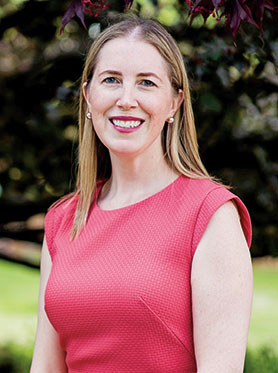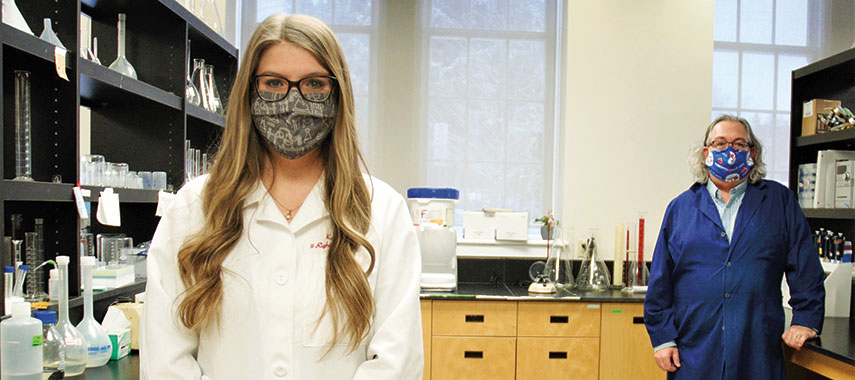From vaccines and PPE to food security and the workforce, a look at how U of G researchers, scholars have helped understand and respond to COVID-19
We couldn’t recap the past year without mentioning You Know What. After all, it changed the world and the work and personal lives of all of us. Over the past year, U of G members did some amazing things to help us all understand and mitigate COVID-19, helping to improve life even in the midst of a global pandemic.
University of Guelph researchers have repurposed innovations, conducted cutting-edge research and provided their expertise to provincial, national and global pandemic efforts.
Confronting the virus was at the same time one of the University’s greatest challenges and one of its greatest moments, says Dr. Malcolm Campbell, vice-president (research).
“We recognized how vitally important our effort would be, how life-saving it could be,” he says. “The faster we could get projects up and running, the better it would be for our world. What we’ve achieved is truly remarkable.”
Well over 100 U of G researchers have contributed their expertise to responding to the pandemic. Here are just a few examples:
Searching for a vaccine
A team in the Department of Pathobiology received $230,000 in provincial funding to develop potential COVID-19 vaccines, adapting research into using vaccines as cancer therapies. The technology uses a proven testing platform of viruses already used to develop cancer vaccines.
By using live vectors to deliver the vaccine directly into cells, the approach ensures an appropriate immune response. The team expects a viable vaccine based on the technology to be ready for Health Canada approval in 2021.

Modelling the spread of COVID-19
Dr. Amy Greer, an infectious disease modelling expert in the Department of Population Medicine, began tracking the spread of the new virus early in the pandemic. Her lab group created a website that illustrates the virus’s spread across Canada (COVID-19 in Canada) by monitoring COVID-19 cases and deaths and tracking changes in case numbers.
Greer also worked on other pandemic-related projects, including a $300,000 federally funded effort to forecast the near-term course of the COVID-19 pandemic and a project that modelled the spread of the virus based on relaxing physical distancing measures in Ontario.
SARS-CoV-2 in pets
In early 2020, some animals were found to be infected with COVID-19, and pathobiology professors Dr. Scott Weese and Dr. Dorothee Bienzle set out to understand why. In April, they embarked on a first-of-its-kind study to examine what risk COVID-19 in humans poses to pets and why some animals become infected while others do not.
The researchers recruited pet owners with COVID-19 symptoms or a positive test for the disease and tested their animals for the virus. They determined transmission of the virus to pets is not uncommon. The team also discovered the first dog in Canada with an active COVID-19 infection.
The pandemic and vulnerable populations
The pandemic has disproportionately impacted vulnerable populations worldwide, including women and girls with disabilities. Dr. Deborah Stienstra, Department of Political Science, is leading a $2.5-million, federally funded research project to increase the global inclusion of women and girls with a range of physical, mental health, intellectual and other disabilities.
The seven-year project is initially focused on the effects of the current pandemic on this largest minority of women in Canada and around the world. It will bring together academics, agencies and governments in Canada, Haiti, South Africa and Vietnam to work with policy makers.
Agri-food and COVID-19
The University’s food and agriculture experts were significant contributors to a special edition of the Canadian Journal of Agricultural Economics, focused on challenges faced by the Canadian agri-food industry during the pandemic and what the future holds.
Dr. Alan Ker, professor in the Department of Food, Agricultural and Resource Economics, co-edited the edition and seven of the 18 articles were written by U of G experts. Drs. Brady Deaton, John Cranfield, Getu Hailu, Alfons Weersink and Mike von Massow examined the pandemic’s effects on the pork, beef, grain and fresh produce industries.
They also examined how pandemic shutdowns have affected the food service, retail and processing industries, food security, the food supply chain and labour issues.

Artistic innovations for challenging times
More than 150 artists from more than 20 countries participated in U of G’s successful IF 2020: Improvisation Festival. Held in August 2020, the 24-hour event garnered some 2,500 viewers worldwide.
Festival director Dr. Ajay Heble, a professor in the School of English and Theatre Studies and director of U of G’s International Institute for Critical Studies in Improvisation, organized the “global community” event at a time when many arts and music events had been cancelled.
In another arts project, enabling musicians to reflect on the pandemic and to showcase their work is the goal of A Sonic Tapestry, a nearly hour-long video curated by Dr. Alyssa Woods and Dr. Kimberly Francis, professors in the School of Fine Art and Music.
The video’s musical compositions and a virtual roundtable discussion comment on the impact of COVID-19 on the music industry.
“Our hope was to highlight the widely varied experiences – whether physical, emotional or creative – of Guelph artists, while allowing their music to draw us together to reflect, grieve and support one another through the pandemic and beyond,” said Francis.
Ethics of immunity passports
Vaccine passports for COVID-19 are intended to help curb the spread of the disease, but are they ethical? Dr. Andrew Bailey, a professor in the Department of Philosophy, is leading a study looking at immunity passports, which might encourage more people to get the shot.
But the idea might lead someone who’s vaccine-hesistant to “purposefully try to get the virus and go through the sickness in hopes to become immune.”
Not everyone who contracts COVID-19 gains immunity, so this strategy poses a health risk not only to the individual but also to others.
COVID-19 and heart health links
Treating or preventing heart damage caused by COVID-19 infection is the goal of biomedical sciences researcher Dr. Glen Pyle.
He also aims to tease out why male-female differences exist in heart injury and potential links to the coronavirus.
He says the problem may arise when infection causes the immune system to go into overdrive and cause life-threatening inflammation.
“Viral infections do increase your risk for cardiovascular disease. Just because you recover from COVID doesn’t mean you’re free and clear. There can be long-term complications.”
Pinpointing the cause of the damage could help in developing drugs and other therapies to treat the heart or the immune system.
Impact of the pandemic on the workforce
Dr. Nita Chhinzer, a professor in the Department of Management, has consulted widely with media on labour force topics during the pandemic, including the challenges of the massive work-from-home shift, the ethics of layoffs through Zoom and paid sick days.
Chhinzer, who has been appointed as advisory board member for Canadian HR Reporter, has also written commentaries for national publications on how the pandemic has impacted the workforce.
